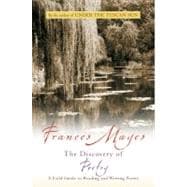The bestselling author of Under the Tuscan Sun brings poetry out of the classroom and into the homes of everyday readers. Before she fell in love with Tuscany, Frances Mayes fell in love with verse. After publishing five books of poetry and teaching creative writing for more than twenty-five years, Mayes is no stranger to the subject. In The Discovery of Poetry, an accessible "field guide" to reading and writing poetry, she shares her passion with readers. Beginning with basic terminology and techniques, from texture and sound to rhyme and repetition, Mayes shows how focusing on one aspect of a poem can help you to better understand, appreciate, and enjoy the reading and writing experience. In addition to many creative and helpful composition ideas, following each lyrical and lively discussion is a thoughtful selection of poems. With its wonderful anthology from Shakespeare to Jamaica Kinkaid, The Discovery of Poetry is an insightful, invaluable guide to what Mayes calls "the natural pleasures of language-a happiness we were born to have."
Frances Mayes is the author of the New York Times bestsellers Under the Tuscan Sun, Bella Tuscany, and In Tuscany, as well as five books of poetry, most recently Ex Voto. Until last year, she taught at San Francisco State University, where she was Chair of the Creative Writing Department. Mayes has published poems in the Atlantic Monthly, the Iowa Review, Ploughshares, Mother Jones, the New England Review, the Mississippi Review, and more. She divides her time between San Francisco and Cortona, Italy.
Sources and ApproachesIf I feel physically as if the top of my head were taken off, I know that is poetry.-emily dickinsonThe Origin of a PoemWhat motivates a poet to write? When Emily Dickinson said about her art, "My business is circumference," she was talking about her desire to explore experience by drawing it into a circle of her own, a world. Similarly, Wallace Stevens wanted each poem to give "a sense of the world." D. H. Lawrence thought the essence of good poetry was "stark directness." Telling or uncovering truth is the prime motive of poets like Muriel Rukeyser, who once asked, "What would happen if one woman told the truth about her life? / The world would split open." William Wordsworth valued "the spontaneous overflow of powerful feelings." When William Carlos Williams called a poem "a machine made of words," he simply meant to say that the best-formed poems function smoothly, with oiled and well-fitted parts, not far from Samuel Taylor Coleridge's ideal, "The best words in the best order."Many poets aspire to reach "the condition of music"-some aim for the heavenly music of the spheres, while others want the words to "boogie." William Butler Yeats thought, "We make out of the quarrel with others, rhetoric, but of the quarrel with ourselves, poetry." His writing emerged from the internal fault line between conflicting thoughts and emotions. Yeats's desire to understand his human condition echoes Walt Whitman, who wanted the reader to "stand by my side and look in the mirror with me." For Matthew Arnold the impulse was external, not internal. His poetry came from "actions, human actions; possessing an inherent interest in themselves, and which are to be communicated in an interesting manner by the art of the poet." Some pull of inner necessity draws the poet to the page, whether to explore a problem, pursue a rhythm, break apart logic, express an emotion, tell a story, or simply to sing. When asked the familiar question, "Why do you write?", writers often answer, "Because I have to," (though prose writer Flannery O'Connor replied, "Because I'm good at it."). The impetus of having to, for the reasons named above, gives poetry its fire and urgency.Because of all these diverse sources, no one ever has come up with a satisfactory definition of poetry, just as no one can define music or art. Those who want to proclaim what is or isn't poetry have thankless work cut out for themselves. No umbrella is wide enough to cover the myriad versions, subjects, and forms. If a poem interests you, better to just go along with Walt Whitman's assertion, "...what I assume you shall assume, / For every atom belonging to me, as good belongs to you." Reasons for reading and for writing seem almost as numerous as atoms.Sometimes poets write to recreate an experience.A Blessing(James Wright, 1927-1980)Just off the highway to Rochester, Minnesota,Twilight bounds softly forth on the grass.And the eyes of those two Indian poniesDarken with k
Excerpted from The Discovery of Poetry: A Field Guide to Reading and Writing Poems by Frances Mayes
All rights reserved by the original copyright owners. Excerpts are provided for display purposes only and may not be reproduced, reprinted or distributed without the written permission of the publisher.

